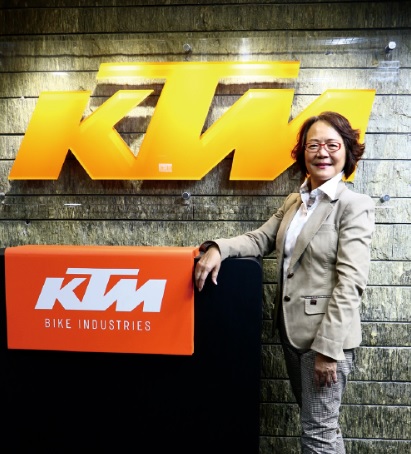A year of extreme difficulties
A year and a half has passed since Covid-19 began to spread around the world. But while the bicycle industry seems unfazed by the situation, it is actually suffering bitterly. As grimly noted by KTM President Carol Chen, the period from 2020 through the first half of 2021 has been an extremely difficult time for KTM. Europe was hit hard by the virus from late 2020 until March 2021, and many KTM factory employees were among those infected. Nevertheless, European governments did not require factories to stop work. Although the KTM plant tried to maintain normal daily production, the gradual loss of many first-line employees caused manpower shortages for close to two months. As a result, production at the plant was intermittent, and it could not fulfill its production plans. And although the outbreaks in Europe came under control after March, there have been disruptions to international supply chains and a severe shortage of shipping containers. Although its employees have returned, KTM consequently cannot assemble bicycles as expected for lack of parts and components.
According to Chen, in spite of an abundance of orders, it is nearly impossible to plan production. She never knows what will happen tomorrow, and production and shipments are running 20% behind the originally planned figures. Because a bicycle cannot be assembled if one essential part is missing, the KTM plant has filled up with parts. KTM’s backlog of orders is now set to stretch into the next quarter. All bicycle plants are facing similar difficulties. Despite the boost the pandemic has given to bicycle and e-bike sales, the industry has been facing great hardship and difficulty. This has entailed higher costs and much hard work for the industry. Taking KTM as an example, the company has been relatively fortunate, and has enjoyed better sales than in 2019. However, while company-wide spirit, effort, and hardships have been double those in the past, the results only 10% better than in 2020, which has been very discouraging.
Recent shortages of cargo containers have been extremely severe. Because of the lack of shipments from Asia, the shortage of inventory in Europe has worsened relentlessly. If this situation continues unabated, the impact on the industry will be harsh indeed! >From the original three months, product lead times have stretched out to as long as three years. And while companies have plenty of orders, the future remains murky. Unable to successfully plan production, many factories have accumulated mountains of stock. Supply chains are currently in the midst of a vicious cycle, and the situation is anything but normal.
Furthermore, dealers are currently suffering severe shortages of products. Due to their sales expectations, many bike shops are frantically placing orders. But when the time comes that suppliers can smoothly ship products, these dealers may end up cancelling their orders due to gluts of stock, or may be unable to pay for their orders. On top of that, many assembly plants are placing orders for twice the usual quantity, since they have plentiful orders and cannot predict when their supplies will arrive. Some are placing parts orders with two suppliers as insurance against contingencies, which may lead to redundant orders. These circumstances bode ill for the future of the parts industry.
After having spent a lifetime in the cycle industry, Carol Chen sighed that this is the first time ever that she has encountered such a state of chaos. So many things cannot be controlled, cannot be predicted, and have no easy solutions. The most important task at hand for Chen is now to perform crisis management, and ensure that she will not be left helpless in the event of any further market upheavals. She foresees that 2023 will be a year of great uncertainty, and hopes that everyone in the industry will be a bit cautious when placing orders.









